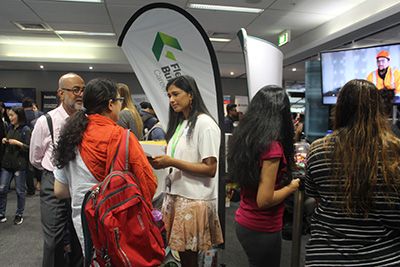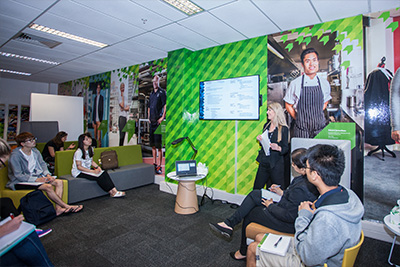A qualification is a great start to finding employment but you also need to develop work ready skills and experience to improve your chances of finding a good job that fits visa requirements.
Here are 8 essential tips to help you
1/ Start planning early
What is your goal? Ask yourself, do you:
- Plan to stay in New Zealand permanently?
- Want to gain New Zealand experience and then go home?
- Want to go home straight after you finish your studies?
It is important to decide what you are aiming for before you finish your studies. Why? You need time to develop the skills and experience needed to get a good job at the right salary, especially if you want to stay in New Zealand and meet visa requirements.
2/ Find out what NZ employers look for in graduates
Do you find you’re more successful with projects or activities when you know what is needed before you start? It is the same with employment. The New Zealand workplace can be quite different from other countries, so it is good to find out what employers want. You can start doing this by -
Looking up company and industry association websites/social media pages - Look at areas of growth, client groups, services. Where are organisations putting their energy and money? Where could you fit in?
Attending networking events/meetups – meet with other students, successful graduates and friendly employers to learn about industry trends and gaps in the marketplace. This can fast track your connections to interested employers.
Attending Career fairs and Employability Matters – this is where you can meet employers and can ask them whether they have opportunities outside of their graduate programmes.
Learn how to talk about the skills, knowledge and experience you have to offer. Practise your elevator pitch so you can have an informative conversation with them. How do you learn how to do this? Attend workshops at Employability Lab (sign up for workshops on Elab Online).
3/ Understand the terminology and levels
Management jobs are not usually available for new graduates. It is best to look at entry jobs that will lead to the job level you’re aiming for. For example, customer support is a common starting point in IT that will open up to coding and programming; in health a coordinator role can lead to team leader opportunities.
Job titles can differ across industries and organisations can be very creative about the titles they put on roles! For example, a story teller, rather than a social media assistant. Traditional roles such as bank teller and retail assistants are often now known as customer service representative roles.
Job descriptions or position descriptions are outlines of the specific and general responsibilities you are expected to undertake in the role. These help you understand the level of responsibility expected of you and therefore, the status of the role. For example, a client support executive for a financial markets’ agency requires a lot more than answering the phone.
Salary bands or pay bands are the pay range stipulated by organisations for specific roles. They express the value a role has to the organisation and is usually based on market value and what an organisation values. These will vary between industries and regions. All public service organisations will follow the same salary bands.
4/ Think about what you can offer the employer
What have you got to offer as an international student beyond your language skills?
- You have proof of two important soft skills – perseverance and determination - demonstrated by studying in another country
- You demonstrate resilience by absorbing the high cost of tuition, travel and living costs as well as overcoming emotional and personal challenges of being away from family and friends.
- You have, as an international student, often overcome language barriers and adapted to a new culture
- You help create a diverse, multi-cultural workforce that will enhance cultural competency of the whole workforce and have an energising effect that can create the best conditions for creativity and innovation.
5/ Become familiar with reliable and trusted sources
If you keep hearing different stories from friends, don’t guess or compare your situation and study to theirs. Everyone’s situation is different and visa requirements can change like the Auckland weather. Seek confirmation from the experts, in this case government agencies, Immigration NZ and Employment New Zealand.
Immigration New Zealand’s (INZ) webpages about working in New Zealand
https://www.immigration.govt.nz/new-zealand-visas/options/study/working-during-after-your-study
INZ tool to assess if your work is skilled
https://www.immigration.govt.nz/new-zealand-visas/apply-for-a-visa/tools-and-information/work-and-employment/skilled-employment
INZ Skills Shortage List Checker
https://skillshortages.immigration.govt.nz/
Employment New Zealand (Government website)
https://www.employment.govt.nz/
Standard Classification of Occupations - NZ and Australia
Australian and New Zealand Standard Classification of Occupations
(This is a useful site with descriptions of roles and occupations that give you a clear outline of the skills, responsibilities and requirements that Immigration NZ will be looking for when assessing applications for specific roles.)
6/ Keep up to date with post-study work visa requirements
You can apply for a visa to work here if you have acceptable qualifications(s) that you completed in New Zealand. Depending on your qualification and where you studied, you can work for any employer for between 1 and 3 years and do almost any work. Read the most up-to-date information here.
Conditions vary slightly if you studied in Auckland. Here are the Auckland conditions.
Level 7 qualification or higher
- Level 7 Bachelor’s degree or higher? You can apply for a Post-study work visa for 3 years.
- Level 7 Graduate Diploma? You can apply for a Post-study work visa for 1 year.
NB: You can apply to work for 1 more year if you are working towards occupational registration with a registration body included in a list of acceptable registration authorities. For example, teachers need 2 years’ work experience before they can get a full practising certificate.
- Any other Level 7 qualification? You can apply for a Post-study work visa for 1 year.
Level 4, 5 or 6 qualification
- Acceptable qualifications at Levels 4 to 6? You can apply for a Post-study work visa for 1 year.
7/ Talk to professionals - it’s ok to ask for help!
Employability Lab Services
Talk to the specialists at Employability & Careers about how to best prepare yourself. Attend workshops and employer events to find out what NZ employers are looking for. Some employers strongly value overseas knowledge and experience, others want NZ experience. You can book for Employability & Careers workshops here.Workshops cover everything from CV and cover letter writing to how to network, interview practice and LinkedIn profiles. We also have a nuber of tools to help you practice your interview skills, including doing online interviews. Check it all on through Elabonline and My CareerLab (access My CareerLab through Elabonline)
International Student Support
Talk to someone at AUT about your visa situation. International Student Support can help with accessing relevant information, discussing options and listening to any concerns you may have. You can book an online appointment to talk to an AUT Student Hub Advisor or International Student Support through the AUT App. Please add your ID number with your name.
AUT App > Menu > Make a Booking > Student Hub > Online > International Visa Queries > Select staff > Confirm Date > Pick Appointment Time Slot > Enter Details
Services of a Licensed Immigration Lawyer
If you want to use the services of a licensed Immigration lawyer to assist with this next step of their journey International Student Support advise you to use a reputable agency listed by the Immigration Advisers Authority https://iaa.ewr.govt.nz/PublicRegister/Search.aspx
8/ Think about options back home
If you're thinking about returning to your home country after graduation, then prepare for that. Focus on researching businesses and professions at home. If you go back home over summer, make the most of that time by finding an internship or work experience connected with your study so you start to make connections with the organisations you would like to eventually work for.
Also have a look at the AUT International Job Portal where you will find organisations from around the world actively seeking students and graduates from their home countries who have the valuable experience of studying overseas. They're offering internships and jobs.
"A proactive connected and informed graduate is going to be employable - that can be you."
Written by Employability and Careers and International Student Support





